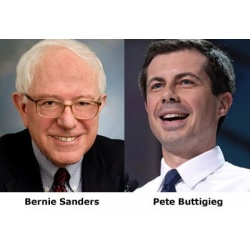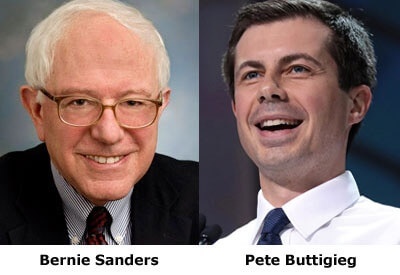
POLITICAL COMMENTARY: Sanders and Buttigieg represent two different paths for Democrats
(by decorahnews.com's Ben Gardner):
Two Democratic Party candidates for President will visit Northeast Iowa Monday afternoon at 1:00 p.m.: Bernie Sanders (Sen., VT) and Pete Buttigieg (mayor, South Bend, IN). Sanders will host a town hall at the North Gym in the Luther College Regents Center. Buttigieg will hold his town hall in Elkader at the same time.
Both candidates have attracted passionate supporters. But besides agreeing on some broad party concerns, both Sanders and Buttigieg have significant differences in terms of policy and persona.
Broadly, both Sanders and Buttigieg more or less agree that U.S. capitalism has failed to maintain prosperity for the general U.S. populace. They both, along with the base of the Democratic Party, have expressed concern over President Trump's domestic and foreign policies, many describing it as authoritarian and nationalistic. Beyond these broad policy similarities, Sanders and Buttigieg—both in persona and substance—have significant differences in how they'd approach a post-Trump U.S.A.
Beyond a consensus on some broad party concerns, the different solutions proposed by Sanders and Buttigieg (as well as their differences in persona and policy), represent a significant division in the Democratic Party as to how they wish to approach President Trump in the general election and how they wish to lead in the future. Though the Iowa caucuses are far away, the congestion in the race indicates an uncertainty among the Democratic base regarding policies and approaches to governance.
Sanders—who has attracted a passionate core of supporters—has had issues broadening support beyond his typically ideologically liberal supporters. However, the liberal base from which Sanders receives the bulk of his support has also proven, in the past, to show up for caucuses in high numbers and with great consistency. Nevertheless, Sander's narrative this time around is largely unchanged from his 2016 attempt—it works with some Democrats (usually at least 15 percent) and not with others.
Once a novelty in 2016, Sanders is now an established candidate; Buttigieg is now enjoying his 15 minutes of fame. Buttigieg's novelty isn't insignificant, but it remains unclear if he can break out and continue to distinguish himself in a congested field of candidates. Sanders now has name recognition; a problem—as well as the pronunciation issue—which continues to tail Buttigieg (in 2007, former President Obama faced a similar problem).
Buttigieg's narrative—a millennial mayor advocating moderate progressive reform—has proven enticing (particularly in the spring) but he—along with Kamala Harris—are having difficulty advancing as the electable alternative to former Vice President Joe Biden, who remains the Democrat front runner. Buttigieg, along with Harris, are trying to attract moderate Democrats, those in the party who think Senator Elizabeth Warren and Sanders are too liberal and Biden is out-of-touch.
The biggest factor in the race for the Democratic nomination remains: Who can beat President Trump? The question is influencing how candidates are approaching constituents, and it is forefront in minds of Democrat voters. Capitalizing on this uncertainty within the Democratic Party will prove decisive in further winnowing the field of candidates. But it's a question that will remain unanswered for some time, and it will be fascinating to observe Iowa's disproportionate influence on this chaotic political race.
Stay tuned to decorahnews.com for continued in-depth political coverage of the 2020 Iowa Caucus.
Site designed and maintained by Iroc Web Design Services©.
Your Small Business Web Design Solutions.™


